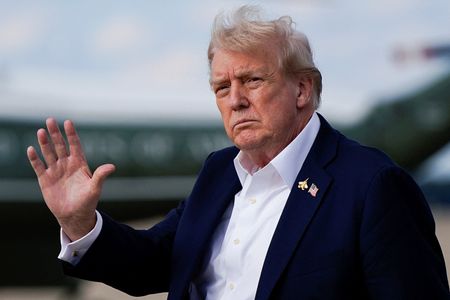By Steve Holland and Brendan O'Brien
WASHINGTON (Reuters) -U.S. President Donald Trump told Reuters on Sunday that he has received a "very good response" to his proposal for ending the war in Gaza and is optimistic about getting Israeli Prime Minister Benjamin Netanyahu to back it when the two meet on Monday.
He said U.S. special envoy Steve Witkoff and Jared Kushner, Trump’s son-in-law who was a Middle East envoy during his first term, were having talks with Netanyahu in New York ahead of the Monday meeting at the White House.
"We’re getting a very good response because Bibi wants to make the deal too," Trump said in a telephone interview, using Netanyahu's nickname. "Everybody wants to make the deal."
When international leaders gathered at the United Nations in New York this week, the U.S. unveiled a 21-point Middle East peace plan to end the nearly two-year-long war in Gaza between Israel and Hamas.
That plan calls for the return of all hostages, living and dead, no further Israeli attacks on Qatar and a new dialogue between Israel and Palestinians for “peaceful coexistence,” a White House official said.
A Hamas representative said on Saturday that the group had not seen the U.S. plan that was presented at the U.N.
Trump on Sunday credited the leaders of Saudi Arabia, Qatar, the United Arab Emirates, Egypt and Jordan, among others, for helping in the process.
He said the deal would not only end the Gaza conflict but would work toward a broader peace in the Middle East.
"Everybody's involved," he said. "Everybody wants it, and Hamas wants it, and one of the reasons is because everybody's tired" of war.
Trump did not provide specific details of a prospective ceasefire-for-hostages agreement in Gaza, but Vice President JD Vance told “Fox News Sunday” that top U.S. officials are immersed in "very complicated" negotiations with Israeli and Arab leaders.
Netanyahu, in an interview on Fox News Channel's "The Sunday Briefing," said it is possible to have amnesty for Hamas leaders under terms of the agreement.
"The details of this have to be worked out. But in previous statements, I said that if leaders, if Hamas leaders, for example, are escorted out of the country, yeah, if they finish the war, release all the hostages. We let them out," he said.
Vance described himself as “cautiously hopeful” about reaching a deal.
"I feel more optimistic about where we are right now than where we have been at any point in the last few months, but let's be realistic, these things can get derailed at the very last minute," he said.
He said the plan has three main components: Returning all hostages, ending the Hamas threat to Israel, and escalating humanitarian aid in Gaza.
"So I think we're close to accomplishing all three of those objectives," Vance said.
(Reporting by Steve Holland in Washington and Brendan O'Brien in Chicago,Editing by Bernadette Baum, Sergio Non, Franklin Paul and Diane Craft)







